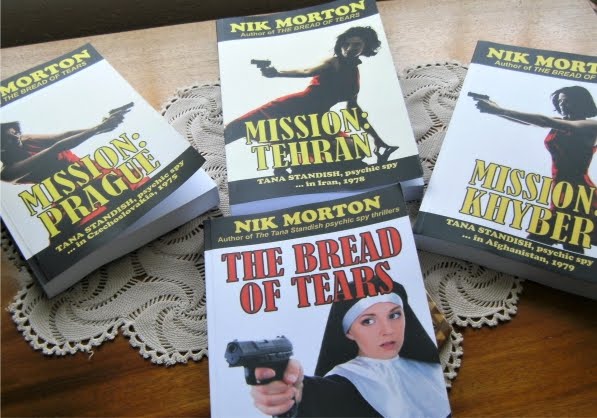Then,
I simply listed the book. Now, I show the book, the author and the date read.
I
won’t present a full list, which might become tedious, but show a few selected titles,
just for interest.
1965
Fittingly,
I read Arthur C. Clarke’s Childhood’s End
in October, 1965 on the fourteen-hour train journey to join the Royal Navy.
That same year, I also read Len Deighton’s Horse
Under Water, which began at HMS Vernon, the naval diving school. My first
draft in the following year after training was to HMS St. Vincent, in Gosport,
across the water from Vernon.
I
read a few true wartime exploit books too – The
White Rabbit (Bruce Marshall, writing the exploits of Yeo-Thomas), Boldness be my Friend (Richard Pape) and
The Colditz Story (P.R. Reid) – all excellent
books about real heroes.
Some years earlier I’d read quite a few similar
titles, such as Odette, Carve Her Name
With Pride, the Cockleshell Heroes, the Dambusters et al. Richard Pape
wrote an espionage novel Arm Me Audacity, which reads as though it was true, not fiction. Of
additional interest is this thread:
I
particularly enjoyed Ray Bradbury’s The
Silver Locusts, alternatively titled The
Martian Chronicles; a visionary and a poet at work. I still possess all his paperbacks, most of them the 1960s Corgi versions.
I
was – and still am – a fan of Victor Canning, and his The Limbo Line didn’t disappoint. In those days I bought and read a
lot of espionage thrillers – there seemed to be a great many around. One series I
enjoyed featured Commander Shaw, by Philip McCutcheon, and in this year I read
his Bluebolt 1 adventure.
The Forbidden Territory was Wheatley’s
first published novel (1933) and introduced his modern trinity of musketeers in
the epicurean Duke de Richleau, financier Simon Aron, and the wealthy young
American, Rex Van Ryn. Happily, Bloomsbury is reprinting all of Wheatley’s
books – www.bloomsbury.com/DennisWheatley
The Devil Rides Out (1934) was his
second Richleau tale and his first black magic novel, which has become a
classic of its kind (the recently released Kindle version is currently #1
in Horror and Occult categories, and #2 for Fiction Classics).
Wheatley’s
point of view was generally omniscient when it suited
the scene or third person when emotional conflict was necessary; though when the story called for it, he used first person narrative too (notably The Haunting of Toby Jugg). These books
are two of his best adventures. The emphasis is on ‘adventure’; he wrote no-nonsense
yet thoroughly researched thrillers with heaps of tension.
Another
time, I’ll take a look at some books I read in 1966 – almost half a century ago!
































No comments:
Post a Comment